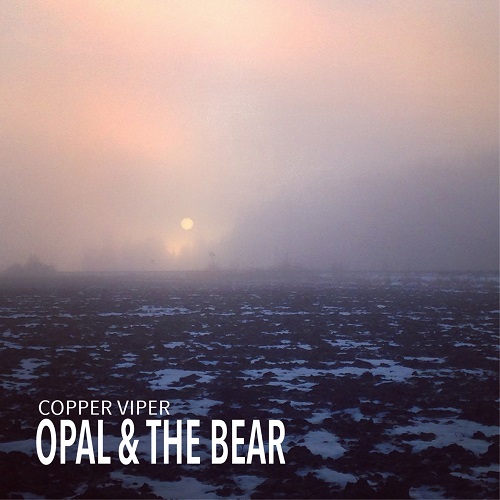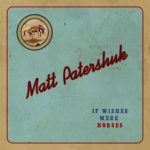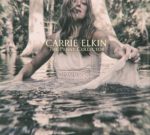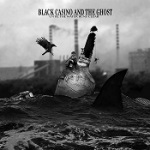
Time for another single, this time from the London-based acoustic folk duo Copper Viper, which is Robin Joel Sangster (vocals and guitar) and Duncan Menzies (vocals, bouzouki and violin), except it isn’t this time because the duo’s a quartet for this release, and they sound very different. The two additional personnel are Issy Ferris (backing vocals) and Archie Sylvester (backing vocals, drums, bass and electric guitar). That’s Ferris and Sylvester, of course, known for their dynamic live performances and Archie’s also the producer for this single.
So this is Copper Viper, Jim, but not as we know it. “Opal and the Bear” opens with an atmospheric, Ennio Morricone-tinged intro, leading in to a first verse that could almost be Copper Viper au naturelle. The first chorus gradually builds to a second verse with the full band and a second chorus with the addition of electric guitar as well. There’s an acoustic solo that’s part Morricone/part Django Rheinhardt before a breakdown into an almost a cappella chorus and a final build-up before an acoustic guitar outro.
This single is dynamic and anthemic and it’s a perfect example of a seemingly unlikely collaboration creating a truly original piece of work.
“Opal and the Bear” is released on Friday January 29th on Under the Bower Records to download and stream.
 “Windrush” is quite a box of tricks. To say it’s eclectic is a bit of an understatement; Daniel Nestlerode romps through a kaleidoscope of styles, sometimes in unexpected combinations, none more so than the title track. “Windrush” is a headlong rush of an instrumental, combining elements of folk, Dick Dale and Ennio Morricone in tribute to the spirit of the people who came to United Kingdom from the Caribbean in response to adverts designed to fill labour shortages in the UK after the war. It’s a tribute to the courage that it took to uproot and travel thousands of miles to create a new home in the grey post-war landscape of the UK. The piece evokes the surging of an ocean voyage and gradually builds to a climax employing acoustic and electric mandolin, acoustic and electric guitar, bass, harmonium and percussion.
“Windrush” is quite a box of tricks. To say it’s eclectic is a bit of an understatement; Daniel Nestlerode romps through a kaleidoscope of styles, sometimes in unexpected combinations, none more so than the title track. “Windrush” is a headlong rush of an instrumental, combining elements of folk, Dick Dale and Ennio Morricone in tribute to the spirit of the people who came to United Kingdom from the Caribbean in response to adverts designed to fill labour shortages in the UK after the war. It’s a tribute to the courage that it took to uproot and travel thousands of miles to create a new home in the grey post-war landscape of the UK. The piece evokes the surging of an ocean voyage and gradually builds to a climax employing acoustic and electric mandolin, acoustic and electric guitar, bass, harmonium and percussion.
The album is a combination of personal and socio-political themes, conceived at a turning-point in Daniel Nestlerode’s life. As an American living in the UK with a French spouse and UK-born children, The Brexit vote was a crucial factor in moving and resettling the family in France. His new local music scene, with rock music predominating, also meant that Daniel incorporated some of his earlier musical experience in the US into the mix, bringing in electric guitars and mandolins, drums and bass at various points in the album.
Coming at such a critical point in Daniel’s life in terms of family upheaval, musical rediscoveries and political uncertainty, it’s inevitable that “Windrush” would be a bunch of contrasts; traditional folk meets rock, electric meets acoustic, vocal meets instrumental, beginnings meet endings, personal meets political and old life meets new life. This is an album that’s being pulled in many directions, yet still managing to sound cohesive, and that’s quite impressive.
The album is topped and tailed by the same piece, “White Flower Waltz”, opening as a short intro and closing as the full version. I’ll leave you to guess what the time signature is. The covers on “Windrush” are an interesting selection; “The Vacant Chair” and “The Parting Glass” are American and Irish respectively and the traditional instrumental “Blackberry Blossom” gets a makeover with a few key changes to cause a bit of a fuss with the purists. The really interesting choice is the Victoria Vox song “C’est Noyé”, which has a strong resonance personal resonance for Daniel and neatly ties in with the Brexit references: ‘Et ils nagent, comme des poisons sans frontière, sur cette terre ronde’ or, roughly ‘The fish swim without borders on this round world’. And, if you didn’t know, “C’est Noyé” means “It’s Drowned”.
However, it’s the songs written by Daniel that supply its emotional heft; “Unexpectedly” telling the story of the meeting that led to marriage, “Living the Dream” dealing with the move to France and “Being a Boy” detailing the joys of family life. The songs and settings of “Windrush” are hugely varied and the album has genuine emotional power.
“Windrush” is released on Clunk & Rattle Records (CRLP021) on Friday August 28th.
 Well, 2019 is certainly going out with a bang. In a period that’s normally characterised by back catalogue compilations and TV stars covering standards, the roots and Americana scene is still alive and kicking, particularly on Steve Dawson’s Black Hen label. “If Wishes Were Horses” is Alberta-based Matt Patershuk’s fourth album and it’s a very fine piece of work indeed. At first glance it appears to weigh in as a bit of a heavyweight with fifteen tracks, but it features four short instrumental fragments with the same leitmotif (more about that later), giving the album a fairly standard twelve-song running time.
Well, 2019 is certainly going out with a bang. In a period that’s normally characterised by back catalogue compilations and TV stars covering standards, the roots and Americana scene is still alive and kicking, particularly on Steve Dawson’s Black Hen label. “If Wishes Were Horses” is Alberta-based Matt Patershuk’s fourth album and it’s a very fine piece of work indeed. At first glance it appears to weigh in as a bit of a heavyweight with fifteen tracks, but it features four short instrumental fragments with the same leitmotif (more about that later), giving the album a fairly standard twelve-song running time.
Matt’s songs tend to simplicity on the surface, while tapping into universal truths about life, love, work and loss, but he likes to look at things through a different lens, lyrically and musically, creating a patchwork quality to the album, which is knitted together by the four short instrumental fragments (titled “Horses” and representing wishes). Each of these fragments weaves a different arrangement around a common melody; all are atmospheric with a cinematic quality using a variety of instruments and textures to create the links pulling the album together. “Horse 1 (For Bravery and Good Fortune)” is an interesting mix of Dick Dale and Ennio Morricone topped off with some very Sixties-sounding organ lines; the other wishes are equally enigmatic.
The album is packed with intriguing and memorable songs across a range of styles from old country to sweaty blues and it’s difficult to pick favourites, but let’s give it a try. The two songs telling stories of Ernest Tubb and Albert King (“Ernest Tubb had Fuzzy Slippers” and “Velvet Bulldozer”) are beautifully-drawn evocations of different stages in the musician’s journey. “Alberta Waltz” highlights the contrast between what people do to live and how they escape from it – ‘Dancing is for dreamers and lovers and fools’, while “Circus” describes a world where the everyday routine is grotesque and fantastical, but people still fall in love and get married. And let’s not forget “Let’s Give This Bottle A Black Eye”, which could only ever be a country song in the Merle Haggard vein.
“If Wishes Were Horses” is a satisfying complete album, featuring a great bunch of songs, superb arrangements and a voice that works perfectly across a range from slow country ballads to greasy Southern Blues. Matt Patershuk deserves to be much more widely known.
The album is released in the UK on Friday November 29th on Black Hen Music (BHMCD0090). In the meantime have a quick look at these videos:
 I’m not going to keep you in suspense; I love this album, it’s a very beautiful piece of work. It’s eleven very special songs (more about that later) interpreted by some very gifted musicians that we’ve reviewed over the last few years here (how about Will Kimbrough, Neilson Hubbard and Telisha Williams for starters, not forgetting Carrie’s husband Danny Schmidt). “The Penny Collector” is a set of songs created during a pivotal period for Carrie Elkin that focus on the circle of life; birth, childhood, adolescence (and rebellion), adulthood and death. It’s built around some of popular culture’s timeless themes; family, nature, love and loss and framed by some of the most gorgeous musical settings you’ll hear this year (or possibly any other). There’s a huge variety of musical stylings across the album, pulled together by the quality of the songs and Carrie’s wonderful voice.
I’m not going to keep you in suspense; I love this album, it’s a very beautiful piece of work. It’s eleven very special songs (more about that later) interpreted by some very gifted musicians that we’ve reviewed over the last few years here (how about Will Kimbrough, Neilson Hubbard and Telisha Williams for starters, not forgetting Carrie’s husband Danny Schmidt). “The Penny Collector” is a set of songs created during a pivotal period for Carrie Elkin that focus on the circle of life; birth, childhood, adolescence (and rebellion), adulthood and death. It’s built around some of popular culture’s timeless themes; family, nature, love and loss and framed by some of the most gorgeous musical settings you’ll hear this year (or possibly any other). There’s a huge variety of musical stylings across the album, pulled together by the quality of the songs and Carrie’s wonderful voice.
The album opens with some atmospheric, almost Ennio Morricone, ambient guitar noises (Will Kimbrough would be my guess) leading into “New Mexico” where the playing is quiet and delicate but the mix is loud; it’s minimal and intimate but in your face at the same time. It’s an indication that you might have to forget about conventions; “The Penny Collector” doesn’t play to any recognised rules.
Throughout the album, Carrie’s vocals are closely-miked and placed right up front and centre; it’s a technique that works when the singer has perfect control, which Carrie has, totally and utterly. There’s a rich poetical seam running through the album (with references to nature, particularly birds), and it’s particularly evident in the adolescent rebellion song “Live Wire” with the line ‘A life half-empty is a life half-spilled’. There’s plenty more to discover but I don’t want to spoil it for you.
As for the musical settings, “Always on the Run” builds up to a Spectoresque climax, the melancholy “Crying Out” is played out over a string section and perfect layers of vocal harmonies and the album’s finale “Lamp of the Body” is a heavily reverbed mixture of mandolin, over-driven guitar and counterpoint vocals creating a sound that’s menacing and gospel-tinged in equal measures.
“The Penny Collector” is a potent mix of Southern American poetry, perfectly subverted musical settings and beautifully controlled vocals. It’ll make you reflect on your own life; the choices you made, the experiences you had, and the support you had from your family and friends. It’s a gorgeous album.
“The Penny Collector” is released on Friday April 7th (CECD07).
 So, where are the likely places to hear someone playing a Telecaster? On a British nineties indie record maybe; the black Tele was the indie guitar-slinger’s weapon of choice. On a country record maybe; James Burton has a couple of signature models. Springsteen? Albert ‘master of the Telecaster’ Collins? How about on a Europop or techno/folk album (whichever description you prefer) by a French artist writing in English and inspired by Tim Burton and David Lynch? No, wouldn’t have been my first choice either, but that’s exactly where we find this particular Telecaster doing its thing.
So, where are the likely places to hear someone playing a Telecaster? On a British nineties indie record maybe; the black Tele was the indie guitar-slinger’s weapon of choice. On a country record maybe; James Burton has a couple of signature models. Springsteen? Albert ‘master of the Telecaster’ Collins? How about on a Europop or techno/folk album (whichever description you prefer) by a French artist writing in English and inspired by Tim Burton and David Lynch? No, wouldn’t have been my first choice either, but that’s exactly where we find this particular Telecaster doing its thing.
But this is about more than Telecasters. Talisco is based in Paris, he’s already well-known across mainland Europe (“Run” was released in France in 2014) and this is the push to crack the UK market. He’s only started singing relatively recently (if my translation of his French Wikipedia page is accurate) and that’s a huge surprise, because his voice is powerful and distinctive with a strong resemblance to Freddie Mercury on the first two Queen albums.
A couple of songs on the album, the opener “Your Wish” and “The Keys” might even sound a bit familiar because they’ve been used to soundtrack ad campaigns in the US and Europe. They’re both a bit lively and, along with “In Love” which separates them on the album, not too representative of the work as a whole.
“Follow Me” has a very sixties, clean and heavy on the reverb, guitar sound while “Sorrow”, with its damped guitar riff hints at the dynamics of Link Wray’s “Rumble”. The early Queen references shine through on the multi-tracked vocals of the acoustic “So Old” and the piano and acoustic guitar arrangement of the album’s closer “Lovely”. The clean Telecaster intro of “Glory” has more than a hint of Mink de Ville’s “Spanish Stroll” and the intro and riff from “Everyone” is pure Ennio Morricone.
“Run” is an album packed with ideas and invention, striding effortlessly across musical styles from various eras with verve and panache. And Talisco does have a great voice. For my money, some of the more uptempo songs opening the album are a bit overdone, and overall it lacks a bit of focus, but it’s certainly an interesting listen and a pretty good hint that there’s much more to come.
“Run” is out in the UK on April 8th on Roy Music (ROY 60).
 We’ve been waiting for this one for a while now, and I’m chuffed to say it was well worth the wait. The second Black Casino and the Ghost album, “Until the Water Runs Clear” is packed with great individual performances, but the great strength is the way they work together as a band. Elisa Zoot’s voice is stunning and Ariel Lerner’s guitar playing is faultless across a range of styles, but Paul Winter-Hart (drums) and Gary Kilminster play a huge part in the band’s sound, supplying the rhythmic pulse and some melodic and inventive basslines.
We’ve been waiting for this one for a while now, and I’m chuffed to say it was well worth the wait. The second Black Casino and the Ghost album, “Until the Water Runs Clear” is packed with great individual performances, but the great strength is the way they work together as a band. Elisa Zoot’s voice is stunning and Ariel Lerner’s guitar playing is faultless across a range of styles, but Paul Winter-Hart (drums) and Gary Kilminster play a huge part in the band’s sound, supplying the rhythmic pulse and some melodic and inventive basslines.
There are some influences which are woven through the album; there’s more than a hint of sixties pop, and a hint of psychedelia channelled through the trip-hop filter of Portishead and Massive Attack or the shimmering nineties pop of Saint Etienne and Morcheeba. So the obvious opening song is one which sounds like early English folk, isn’t it?
“The Pool” proves that Elisa can do the quieter, more reflective songs as well as the belters, starting with a finger-picked acoustic guitar backing and multi-layered backing vocals, adding shards of percussion, synths and slide guitar before dropping back to the minimalist guitar backing. After the trippy feel of “Age of Contagion” and the monster guitar riff of “Veggie Tarantula” (the two singles so far), it’s a bit of a departure but it’s very effective.
The sixties influence is clearest in “Soul Mall”, the bass-led “Sherry” where Elisa delivers the verses in a cool, almost dismissive style, and “Mr Puppeteer” and “Hoochie Coochie Lover” where Ariel plays in a clipped, precise style that’s very Hank Marvin, or maybe it’s just like Eddie. Apart from the obvious “Lucifer, Lucifer, Lucifer”, there’s a darkness and obsession suffusing the album, and it surfaces in lines like ‘Wish I could skin you, look at what’s in you’ in “Hoochie Coochie Lover”; it’s challenging and not always comfortable but, if comfort’s what you want, you should be listening to Smooth Radio.
There are still a few more stylistic twists and turns to the album; “Tarjeteros” has an Ennio Morricone feel, “Bitter Beast” contrasts a verse with a hint of Bjork with a wall of sound chorus, while the album’s last song, “Solar Storm”, closes the circle with Elisa’s controlled vocal over a sparse arrangement that builds with keyboards and backwards effect before fading into the ether.
I don’t think I’ve heard a better album than “Until the Water Runs Clear” this year; Black Casino and the Ghost have created an album that’s full of hooks to grab your attention, but is full of dark and mystical undercurrents to keep you enthralled.
“Until the Water Runs Clear” is out now on Amazon and iTunes. Go on, treat yourself to an early Christmas present.
If you want to see Black Casino and the Ghost live (and you really should), they’re playing at The Finsbury on December 8th and it’s completely free.
 229, The Venue? It’s easy to get to because it’s part of the International Students’ House complex just across the street from Great Portland Street tube station. Venue 2 is a basement room with a stage at one end and a bar on one side. The acoustics are reasonable so it’s not a bad place to watch up-and-coming bands. My mission tonight, if I choose to accept it, is to have a look at London alt-indie (let’s leave the description at that for the moment) band, Vera Lynch. In keeping with their highly eclectic sound, the band has a multinational line-up with members from the UK, USA, Hungary and the Far East. They are: Sándor Sztankovics (drums), Ted Barker (bass), Keisuke Nishikawa (guitar), Brian Pistolesi (guitar) and Guy Harries (vocals).
229, The Venue? It’s easy to get to because it’s part of the International Students’ House complex just across the street from Great Portland Street tube station. Venue 2 is a basement room with a stage at one end and a bar on one side. The acoustics are reasonable so it’s not a bad place to watch up-and-coming bands. My mission tonight, if I choose to accept it, is to have a look at London alt-indie (let’s leave the description at that for the moment) band, Vera Lynch. In keeping with their highly eclectic sound, the band has a multinational line-up with members from the UK, USA, Hungary and the Far East. They are: Sándor Sztankovics (drums), Ted Barker (bass), Keisuke Nishikawa (guitar), Brian Pistolesi (guitar) and Guy Harries (vocals).
If you could splice the musical DNA of Dick Dale, Ennio Morricone and English ‘80s post-punk, you might come close to defining the Vera Lynch sound; you might even want to throw a bit of early Bowie and INXS in there. The band has an EP out at the moment, “Evil Cowboy Surfer Songs” (to be reviewed here soon), and you might expect to hear all four songs from the EP as part of a short live set, but it doesn’t work out that way because, well, this is Vera Lynch. In fact, only two songs from the EP, “Fire” and “”Evil Cowboy Surfer Song”, make the live set. The band opens with “Dog in the Club” and then “Lost Property”, “Horror Doctor”, “Child of Jago” and the anthemic closer, “The End of the World”, follow the two songs from the EP.
It’s quite a spectacle; the band look great and they play together as a very tight unit, moving through varying musical moods with style and panache and providing a bedrock for the lead vocals. Guy Harries is mesmeric and messianic, a twenty-first century Ian Curtis (but with a sense of rhythm) who transfixes the audience with his scary, stary-eyed delivery and a voice that might just have a hint of Freddie Mercury in there as well. Musically and visually, they are impossible to ignore and you really should make the effort to go out and see them.
If you want to see Vera Lynch live in the next few weeks, you can see them at The Dolphin in Hackney on Friday February 28 or Underbelly in Hoxton on Friday April 18.


